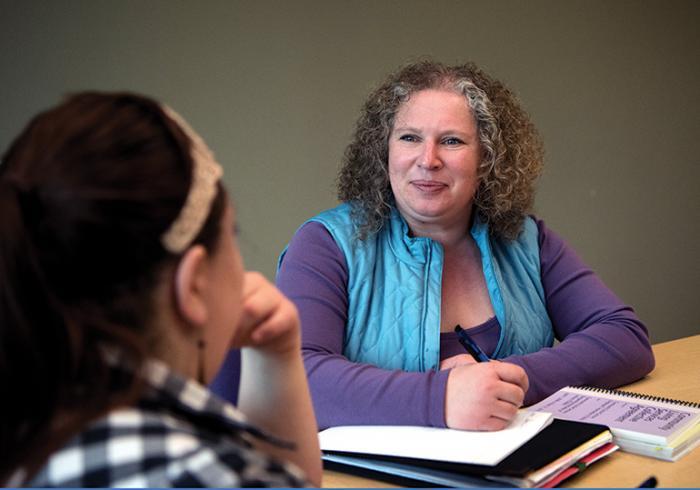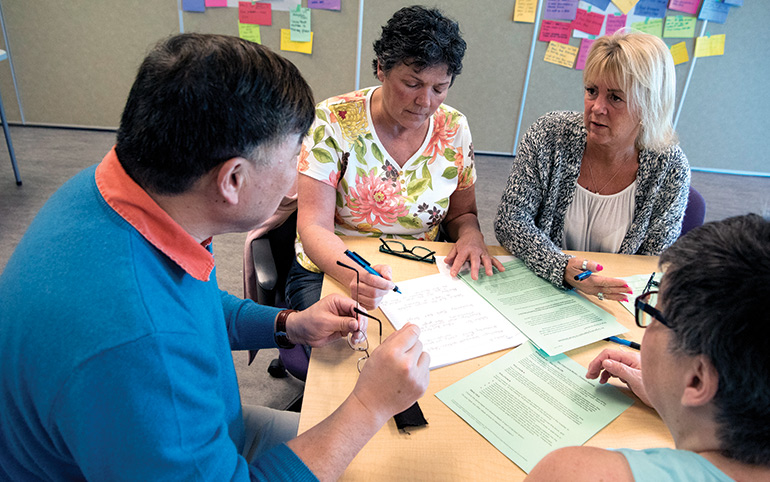
“It feels good to get a positive outcome to a problem, even behind the scenes – you made that person’s day, and you made your work site better,” says Sunshine Coast shop steward Laura-Lee McNab.
She’s one of hundreds of stewards, both new and experienced, attending HEU’s shop steward training workshops this spring. They say seeing the collective agreement enforced and grievances resolved gives people a sense of power in their work lives and boosts morale – often the most rewarding result of a steward’s challenging job.
HEU offers a full range of steward education classes in locations around B.C., aimed at every skill level. Level One introduces new and potential stewards to the role, reviews the collective agreement, and teaches the steps involved in handling grievances.

Level Two classes build communication and advocacy skills, and train stewards to meet with management. The intermediate level “Know and Enforce Your Rights” workshop focuses on deeper understanding of collective agreement rights, as well as human rights and conflict in the workplace. HEU also offers further training for chief shop stewards.
Each member becomes active for reasons of their own, but most are motivated by their own positive experience of having a steward go to bat for them on a workplace matter.
Some members have a drive to fix a workplace issue; others want to learn about their rights. And some are “naturals”, the ones co-workers routinely gravitate toward for help.
Silvia Jaime found she often ended up being a “peacemaker” at her Lions Gate Hospital local. “Now, I will actually be able to help resolve conflicts with confidence.”
Maricris Avenido, a steward at Surrey Memorial taking the Level Two class, says the protection stewards are provided under the collective agreement allows her to be calmer and more impartial.
“Before becoming a shop steward, I was defensive, ready to argue with management all the time. Now, I know our rights, and I know I can stand up for them.”
Finding time, however, can be an obstacle. Most say their duties take between five and 10 hours a month.
Some tasks can be done during a shift, and stewards can apply for paid leave for union business, but accommodations vary. So, it can be necessary to meet with members or communicate with servicing reps on evenings and days off.
Another concern is feeling pressured to solve everyone’s problems.
But stewards agree that a large part of their job is helping members find their own solutions. The goal is to assist, but also to empower and share knowledge.
“Stewards are the experts in their workplace,” says HEU education director Juli Rees. “They know the working conditions, the employer, their co-workers. They are the best people to find the solutions.”
About 75 per cent of members, who go through any shop steward training, remain active in the union, she says, although they may get involved in their local in other ways. Or it may take them some time to feel ready to go forward, or to see how they can contribute.
Danica Santos is a young worker at Royal Columbian Hospital, in an emergency department that has seen a recent wave of retirements, including the last shop steward, who recruited her to step in. “So, we’re mostly new people, young people. Sometimes I feel we are being taken advantage of, [management] thinks we are not aware of our rights.”
All agree that when members know their rights and can speak up with confidence, the local is stronger, the union is stronger, and the role of shop steward is more effective and rewarding.
Interested in becoming a shop steward? Contact your local executive or current shop steward. Find dates for HEU shop steward workshops at <heu.org/workshops-and-training>.
by Elaine Littmann